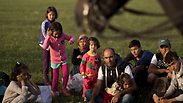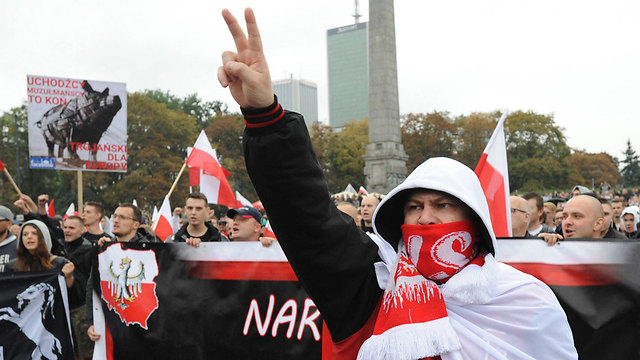
Eastern Europe vs. refugees: A suppressed historical memory?
Op-ed: Prof. Jan Tomasz Gross believes that Hungary, Slovakia and Poland's stubborn refusal to take in more refugees stems from their failure to engage in a conscientious, national and personal self-examination of their conduct during World War II; whether he is right or wrong, facts are on his side.
According to Prof. Gross' calculations, about 30,000 Germans at the most were killed in the German invasion of Poland and in the Polish resistance activities from 1939 to 1945, while the number of Jews murdered by the Poles during the war was much higher.
Prof. Gross, who investigated and uncovered the murder of the Jewish residents of the town of Jedwabne by their Polish neighbors and the anti-Semitic persecutions of the survivors in post-war Poland, harshly criticize the Eastern European countries' stance towards the wave of new refugees.
The stubborn refusal to take these refugees in, apart from several thousand, stems in his opinion from the fact that their people did not engage in a conscientious, national and personal self-examination of their conduct during World War II. His arrows are especially directed at Hungary, Slovakia and Poland. Germany, he believes, did conduct a self-examination.

The reactions in Poland to Prof. Gross' article, which was published in leading websites and in the newspapers that are part of the prestigious Project Syndicate, were unusually harsh, including by intellectuals and historians who welcomed his books and publications in the past. Gross has been accused of historical distortion, sociological primitiveness, a failure to understand the processes the European nations are going through, and mainly hatred of Poland. Self hatred.
The Poles see themselves (and largely rightfully so) as a heroic people in their war against the Nazi occupier and in their resistance's activities. And here comes Jan Tomasz Gross from faraway Princeton University, and using dry figures, casts a sort of doubt, even disregard, over that heroic battle: Who was your real enemy if you killed more Jewish neighbors than German occupiers? He asks his people. This is an accusation which has never been hurled at them.
Further anger was caused by the comparison with Slovakia and Hungary in regards to the World War II heritage. While Hungary and Slovakia concealed and erased their cooperation with the Nazis, including in the annihilation of the Jews, Poland hasn't stopped engaging in the issue, picking at its wounds, beating its breast and rocking the national conscience. It’s unfair and wrong to draw a line comparing us to the Hungarians and Slovaks, Gross' colleagues – Polish intellectuals – replied.
Whether Gross' explanation, which attributes the unwillingness of Poland's citizens to take in refugees to a suppressed historical memory, is right or baseless, the facts are on his side: Each of the countries at which he lashed out has taken in between 50,000 to 90,000 migrants from countries outside the European Union from the early 1990s till August this year.
Germany, on the other hand, has taken in about four million non-European migrants and is still taking them in, although at a slower pace. Even less wealthy European countries like Spain, Italy and Greece have extended a more generous hand to the refugees.
But were the roots of the European conduct today really planted in the 1930s and 1940s?
Prof. Gross believes they were. He believes that the annihilation of Europe's Jews is not just a crime from the distant past; it's a radical expression of a characteristic which still strongly exists in the European tradition, faith and civilization wherever it is. There are nations which are aware of its existence, and therefore make efforts to disconnect from it once and for all; and there are those which are unaware, and are even proud of it.
Its existence, Prof. Gross believes, may explain the Europeans' attitude today towards refuge-seeking foreigners who are not Jews – and perhaps also, although Gross doesn’t touch on the subject, towards the Jews remaining in Europe. His article serves as a warning from the past to the present.










